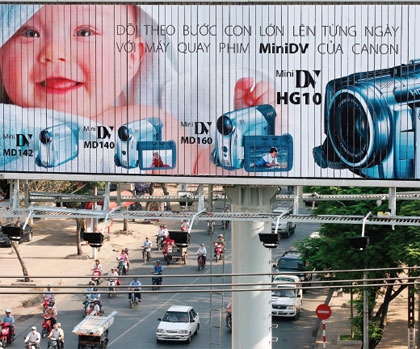Advertising cap leaves firms short

Nguyen Ngoc Tuyen, head of Academy of Finance’s Institute of Economics and Finance, said the institute had just issued a survey over 300 local and foreign enterprises in Hanoi, Danang and Ho Chi Minh City, which revealed 52 per cent of foreign enterprises said they were badly affected by the advertising and promotion (A&P) expenses cap, while 27 per cent of local enterprises said they were “very badly” affected by this regulation.
While 51 per cent of big foreign and local enterprises said the regulation “very badly” hurt them, 26 per cent of small- and-medium-sized local and foreign enterprises said they were badly hit by this regulation.
Firms in the banking, electronics, drinks, foods and cosmetics sectors were worst hit.
Some 58 and 28 per cent of foreign and local enterprises respectively said the cap had badly affected Vietnam’s business climate.
Vietnam has capped A&P expenses since 1999. Under the current Corporate Income Tax Law issued in November 2007, the A&P cap has since January 1, 2009 been 10 per cent for enterprises operating for over three years and 15 per cent for enterprises during the first three years of operations. This rate is deducted when enterprises pay their taxes.
According to Vietnam Association of Financial Investors (VAFI), the regulation was aimed at preventing enterprises from invoice fraud and protecting local enterprises from foreign rivals.
“The current A&P cap is not suitable now, because it impedes enterprises to promote their image internationally,” said VAFI chairman Quach Duc Phap.
Dinh Thi My Loan, general secretary of Vietnam Association of Retailers, said: “We propose that the A&P cap should be raised to 20 per cent from 2012 and gradually removed, so that enterprises can have more space to promote their brand-names and expand production.”
According to EuroCham, the cap was making Vietnam less competitive.
“The government may in reality be collecting much less tax than it should have been able to, because the A&P cap discourages inflow of foreign investment and expansion of existing businesses, with investment, capital and tax accruing to other markets in the region. Less investment or expansion also means fewer jobs created, and less personal income tax collected,” said EuroCham chairman Preben Hjortlund.
He said making advertising and promotion uneconomic for enterprises meant the amount of product information available to consumers was much reduced and the level of competition restricted, both of which disadvantaged consumers.
What the stars mean:
★ Poor ★ ★ Promising ★★★ Good ★★★★ Very good ★★★★★ Exceptional
Related Contents
Latest News
More News
- Foreign fruits flood Vietnamese market (December 09, 2025 | 13:22)
- Vietnam’s fruit and vegetable exports reach $7.8 billion in first 11 months (December 05, 2025 | 13:50)
- Vietnam shapes next-generation carbon market (November 26, 2025 | 15:33)
- PM urges Ho Chi Minh City to innovate and remain Vietnam’s economic locomotive (November 26, 2025 | 15:29)
- Experts chart Vietnam's digital finance path: high hopes, high stakes (November 14, 2025 | 10:56)
- Vietnam’s seafood imports surge 30 per cent in first 10 months (November 10, 2025 | 19:35)
- Vietnam’s durian exports hit $1 billion milestone (October 30, 2025 | 17:41)
- Beyond borders: Sunhouse and new era of Vietnamese brands on Amazon (October 28, 2025 | 10:46)
- Record-breaking trade fair set to open in Hanoi (October 15, 2025 | 15:59)
- Timber sector seeks solutions to VAT refunds (October 14, 2025 | 18:58)

 Tag:
Tag:




















 Mobile Version
Mobile Version